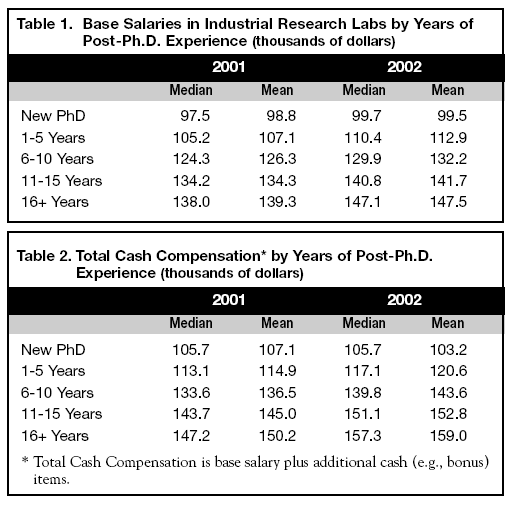THIS IS AN ARCHIVED VERSION OF CRA'S WEBSITE. THIS ARCHIVE IS AVAILABLE TO PROVIDE HISTORICAL CONTENT.
PLEASE VISIT HTTP://WWW.CRA.ORG FOR THE LATEST INFORMATION
| About CRA |
| Membership |
| CRA for Students |
| CRA for Faculty |
| CRA-Women |
| Computing Community Consortium (CCC) |
| Awards |
| Projects |
| Events |
| Jobs |
| Government Affairs |
| Computing Research Policy Blog |
| Publications |
| Data & Resources |
| CRA Bulletin |
| What's New |
| Contact |
| Home |
<< Back to November 2003 CRN Table of Contents
[Published originally in the November 2003 edition of Computing Research News, Vol. 15/No. 5, p. 3.]
Results of CRA Industrial Salary Survey of CS Research Labs
By Jim Horning
In October 2002, CRA conducted its sixth Industrial Salary Survey of CS Research Laboratories. Twelve organizations representing 706 researchers responded. (In 2001, eleven organizations with 689 researchers participated.) Of these 706 researchers, 87 percent held Ph.D.s, 9 percent master’s degrees, 4 percent bachelor’s degrees, and <0.1 percent other. Organizations were asked to provide data about base salary and total cash compensation (which includes items such as bonuses). Respondents were asked to report means and medians for each category. Companies that completed the survey received detailed results in January 2003. A summary of the results is presented in Tables 1 and 2.

Since the bursting of the Com/.com stock bubble, many stock options have lost their value, and evaluating the others would be highly speculative. We made no attempt this year to evaluate the contribution of options to total compensation.
Observations
The main finding of the 2001 survey was that there were gains in base salaries (except for new Ph.D.s), but that total compensation (including estimated value of options) had dropped significantly. The 2002 survey shows what may be a slight reversal of that trend, with both salaries and total cash compensation rising by about 5 percent. The exception is new Ph.D.s, where gains were noticeably smaller, and where the mean cash compensation dropped almost 4 percent.
Variable cash compensation remained fairly steady at about 8 percent of base salaries.
Comparing these data with the most recent Taulbee Survey salary data (see March 2003 issue of Computing Research News), it is clear that at all levels base (9-month) average faculty compensation remains substantially lower than industrial compensation. However, if we assume that faculty actually receive 12 months of compensation at the 9-month rate (i.e., 4/3 of 9-month compensation) through a combination of summer salary, consulting, book royalties, and other sources, then full-professor compensation lags industrial compensation for those with 11 to 15 years of experience by less than 10 percent. However, compensation for assistant and associate professors still lags that of comparably experienced industrial researchers by around 20 percent.
It is also interesting to take a slightly longer perspective on industrial trends. CRA’s first Industrial Salary Survey was conducted in the fall of 1997. At that time nine companies, representing 655 individuals, reported average salaries ranging from $86K for new Ph.D.s to $171K for those with 16 plus years of post-Ph.D. experience. The five-year compound growth rate has been almost 4 percent for new Ph.D.s, and slightly negative for the most experienced group. However these numbers are not strictly comparable, since the 1997 data included “the estimated value of bonuses and stock plans as determined by each respondent.”
In October 2003, CRA mailed questionnaires for the 2003 survey of industry lab salaries. Companies that complete the survey should receive the results in December.
I would especially like to thank Drew Sutter of CRA for his excellent efforts in collecting, analyzing, and organizing this data.
Dr. Horning is Chief Scientist of Network Associates Laboratories, and is a member of the CRA Board. He is Chair of CRA's Industry Committee.
Copyright © 2007 Computing Research Association. All Rights Reserved. Questions? E-mail: webmaster@cra.org.
